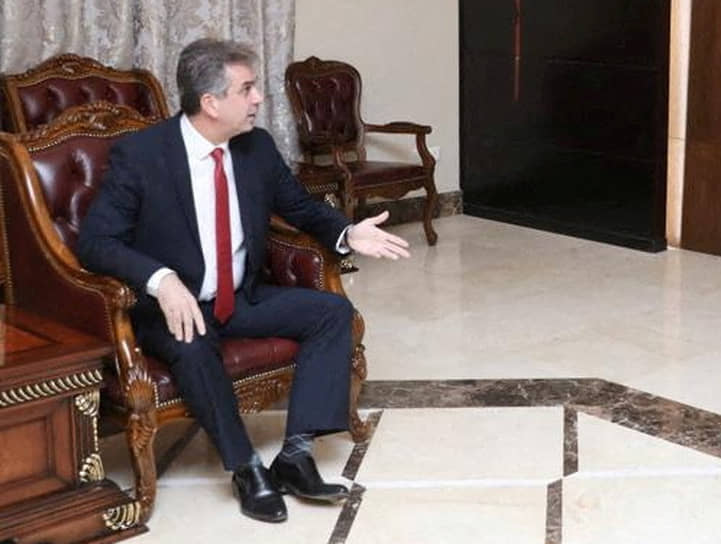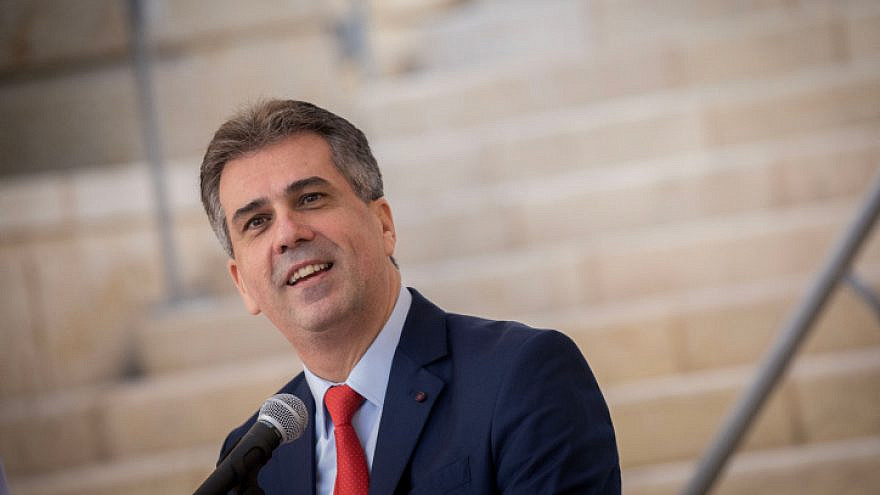The organizers of the visit of Israeli Foreign Minister Eli Cohen to Kyiv, scheduled for this week, faced a lot of problems at the preparation stage.
The Ukrainian side presented the Israelis with a list of preconditions, including the condemnation of the “Russian invasion” and the provision of a loan of half a billion dollars. Kyiv made it clear that without meeting these and other requirements, the minister’s meeting with Ukrainian President Volodymyr Zelensky, which the Israelis requested, might not take place.Expand to full screen

Photo: Reuters
Eli Cohen’s trip to Kyiv, scheduled for this week, should be the first official visit by an Israeli minister to Ukraine in a year. Kyiv sees the upcoming talks “as a test of the intentions and policies of the new Israeli government.” This was announced on Sunday, citing high-ranking sources in Israel and Ukraine, by Israeli journalist Barak Ravid, who writes for the Walla and Axios websites. It is expected that Mr. Cohen will meet in Kyiv with his Ukrainian counterpart Dmitry Kuleba. The Israeli Foreign Ministry also requested a meeting between the minister and Ukrainian President Volodymyr Zelensky, but there is no confirmation from Kyiv yet. “A Ukrainian official said that the meeting would take place if Israel showed readiness to take steps to support Ukraine,” wrote Barak Ravid.
His source stressed that Volodymyr Zelensky would not go to meet Eli Cohen “just for a photo shoot.”
According to an Israeli journalist, on the eve of Eli Cohen’s visit, Ukraine sent a number of demands to Israel . “The first of these is a clear public condemnation of the Russian invasion and support for the territorial integrity of Ukraine , as well as the approval of a loan of half a billion dollars ,” said Barak Ravid. According to him, Kiev is also waiting for public support for the peace plan presented by Volodymyr Zelensky in November last year and including the complete withdrawal of Russia from the territory of Ukraine.
Another requirement of Kiev concerns the admission for treatment of hundreds of victims of hostilities, both military and civilian . Israeli doctors worked on the border with Ukraine, when there was a large flow of refugees from there to Europe in the spring. Israel also hosted the wounded, but so far it has been about a few dozen, not hundreds of patients.
In addition, Ukraine hopes that Israel will continue the project to transfer technologies related to smart missile and drone attack alerts to Kiev . On Sunday, Ukrainian Defense Minister Oleksiy Reznikov confirmed that such a promise had previously been made, but found it difficult to specify the timing of the technology transfer.
How Israel will react to the demands of the Ukrainian side is not yet completely clear. The request for a loan was sent to the previous Israeli government and was rejected by the then Minister of Finance, Avigdor Lieberman. Israeli media report that Eli Cohen is ready to offer Kyiv a loan of $50 million, that is, ten times less than required. Perhaps the issue of treating the wounded will be resolved. But with the requirement of direct condemnation of Russia is more difficult. Especially in light of Eli Cohen’s statement, made in early January upon taking office as Foreign Minister, that the new Israeli government “will make less public appearances” on Ukrainian issues.
From the very beginning of hostilities in Ukraine, Israel tried to balance its policy in the Ukrainian direction. The only one who allowed himself direct criticism of Russia’s actions was the previous Prime Minister Yair Lapid, who, while still head of the Foreign Ministry, accused Moscow of “war crimes.” The rest were more cautious.
In addition, Israel has repeatedly refused Ukraine’s requests for military assistance, fearing to spoil relations with Russia. This is primarily due to the presence of the Russian military in Syria, as well as Moscow’s contacts with Tehran and regional radical groups – the Lebanese Hezbollah and the Palestinian Hamas.
And it was precisely this cautious position that Benjamin Netanyahu always adhered to, who used to like to call himself a friend of the Russian president. Being in opposition, he urged to think first of all about what is happening in the “backyard” of Israel. Returning to the premiership at the end of December, Mr. Netanyahu personally faced pressure from the United States, which supports Kyiv’s requests for military assistance. And it is impossible to speak less on the topic of Ukraine. Last week, in two interviews in a row – first to the American television channel CNN, and then to the French LCI, Mr. Netanyahu said that he was studying the topic of military assistance, including the supply of Iron Dome air defense systems. True, he stressed that he “would not take on any firm commitments” in this matter.
Meanwhile, the same Barak Ravid, citing three senior Israeli officials, wrote last week that the Israeli government is reconsidering its policy both regarding the assessment of Russian actions in Ukraine and regarding the supply of defensive weapons systems. It is alleged that the work is being carried out under the leadership of the National Security Directorate under the Office of the Prime Minister with the involvement of the Ministry of Defense, the Foreign Ministry and the Mossad foreign intelligence service.
It is noted that during the talks held in Jerusalem a week ago with US Secretary of State Anthony Blinken, Mr. Netanyahu personally promised him to do no less for Ukraine than the previous government. True, he did not promise more.
However, as Barak Ravid notes, citing sources, there is a growing number of those in the Israeli defense and intelligence community who believe that Israel should provide military assistance to Ukraine, but in a way that does not spoil relations with Russia.
However, no fundamental changes in this direction are foreseen so far. This is confirmed by Israeli sources of Kommersant. At the same time, judging by the publications of Barak Ravid, the United States was convinced that Benjamin Netanyahu “does not intend to move in the direction of Russia.” Namely, such fears were in the West and in Kyiv after the change of the Israeli government in December. Eli Cohen’s visit to Ukraine should be another proof for the US that the Israeli government is ready to help Kyiv. The only question is that the Ukrainians are still unhappy and are trying to put pressure on Israel.
And, unfortunately, on the eve of Eli Cohen’s visit to Kyiv, a new misunderstanding arose between Ukraine and Israel. At the end of the week, an interview was posted on YouTubeformer Israeli Prime Minister Naftali Bennett, whose short reign saw the outbreak of hostilities in Ukraine. In early March, hoping to mediate between Moscow and Kyiv, Mr. Bennet rushed to the Russian capital to meet with President Vladimir Putin. According to Naftali Bennett, he obtained a promise from the Russian president not to kill Volodymyr Zelensky, about which he informed the latter. The ex-premier also claims that Vladimir Putin agreed to abandon the plans to disarm Ukraine, which were declared, among other things, at the beginning of the Russian “special military operation”, and Mr. Zelensky promised to reconsider Kyiv’s plans to join NATO. At the same time, Mr. Bennet noted that negotiations between Ukraine and Russia were ultimately blocked by Western countries, but at the same time he stressed that any consultations between the parties lost their meaning after it became known about what had happened in Bucha. Recall that Kyiv and the West accuse the Russian military of massacres. Moscow calls all statements on this topic fakes.
In Kyiv, the words of Naftali Bennett caused outrage. In particular, Mikhail Podolyak, an adviser to the head of the office of the President of Ukraine, called them “fictitious.” In Moscow, on the contrary, they took what was said as evidence of the failure by the West of the negotiation process between Russia and Ukraine.
Eli Cohen will not have to answer for the words of former Prime Minister Eli Cohen, given that he and the new Israeli government act as political opponents of Mr. Bennett. However, the interview of the ex-premier, which appeared the other day, does not improve the atmosphere of the upcoming visit either.
Source : Kommersant


